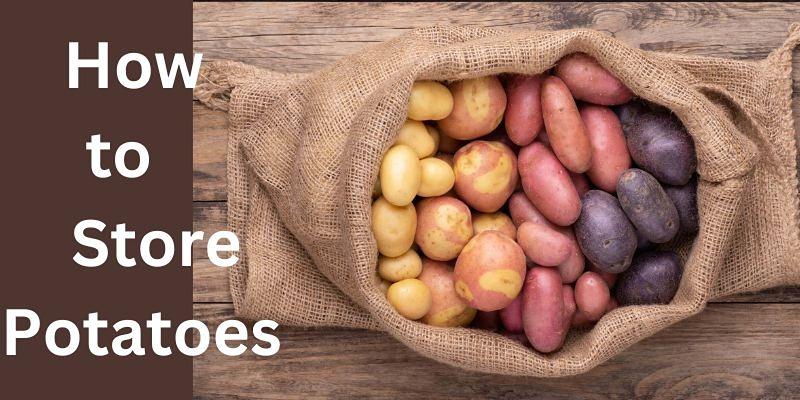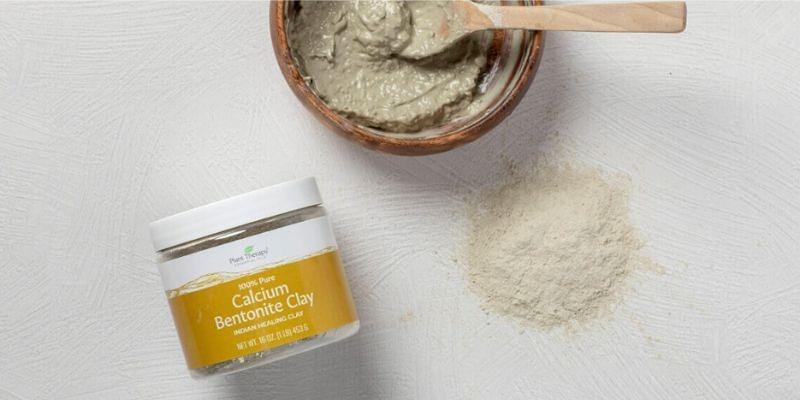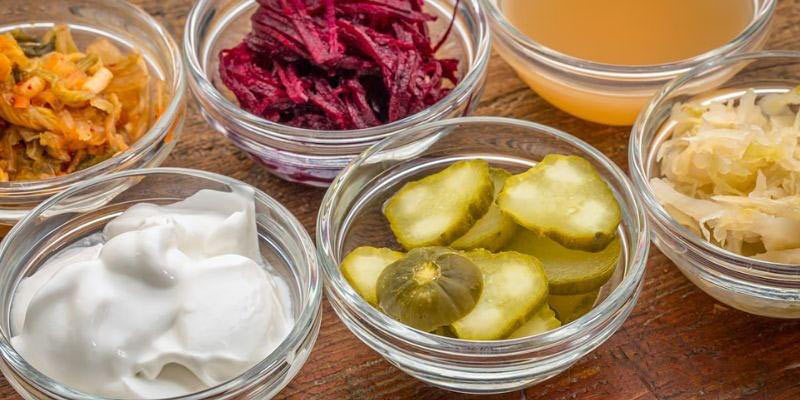If you love potatoes, knowing how to store them properly is essential to keeping them fresh and lasting as long as possible. Potatoes are a staple in many households and can provide a tasty addition to any meal.
However, if they're not stored correctly, they can quickly spoil. In this post, we'll discuss all the tips and tricks you need to know about storing potatoes so your family always has some for snack time or dinner!
Store Raw Potatoes in a Cool Place
Proper storage of potatoes is essential for preserving their freshness and taste. Potatoes should be stored in a cool, dark place. The ideal temperature range to store potatoes is 45-50°F (7-10°C). A kitchen cupboard away from the stove or other heat source is generally best. Light can also cause potatoes to turn green, so dark places are ideal.
When storing potatoes, ensure they are placed in a dry area and not exposed to moisture. If moisture is present, the potatoes will start to rot quickly. The best way to store potatoes is in a paper bag or cardboard box with holes punched for ventilation.
Keep Them Out Of The Sunlight (But Not Out Of Sight)
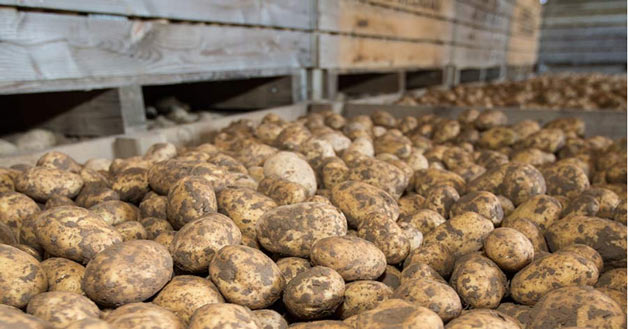
Potatoes should be stored in a cool, dark space such as a pantry, cupboard, or cellar. Keeping them out of the sun will help prevent sprouting—which can affect their taste and texture. They should also be stored away from moisture sources like sinks, water heaters, or washing machines to ensure they stay dry.
Potatoes should be stored in a breathable container such as a paper or mesh bag for optimum freshness. Ensure the bag is loosely sealed and allow air circulation to keep them from getting too warm. If you don't have any bags, they can also be stored in an open basket. Whatever container you choose, ensure it's out of direct sunlight and away from heat sources.
When storing potatoes, keep in mind that potatoes should never be stored in the refrigerator. This can turn their starches into sugar, resulting in a sweet taste and mushy texture. To keep them fresh for as long as possible, store them in a cool, dark spot with flowing air, and they should last up to two months.
Don't Store Raw Potatoes in the Fridge or Freezer
While storing raw potatoes in the refrigerator or even the freezer is tempting, it is not recommended. Storing them in cold temperatures causes the starch to convert to sugar more quickly, which leads to a sweeter flavor and an off-putting texture when cooked.
Furthermore, storing potatoes at temperatures lower than 40°F increases their susceptibility to a disorder called "cold-induced sweetening," leading to an undesirable taste when cooked.
Place in an Open Bowl or Paper Bag
If you plan to use your potatoes within a few weeks, you can store them in an open bowl or paper bag. Make sure the potatoes are dry before storing and spread them in a single layer. Place the bowl or paper bags in a cool, dark, well-ventilated pantry or garage. To further extend their shelf life, can place an apple in the bag with the potatoes, as it will help to keep them from sprouting.
Don't Wash Before Storing
When storing potatoes, it's important not to wash them before putting them in the pantry. This is because washing can cause bruising and excess moisture, leading to rot. If you need to remove dirt from your potatoes, simply brush them off with a dry cloth or vegetable brush.
Make Sure They Still Have Airflow
Storing potatoes correctly means they need to continue getting airflow. The best way to store them is in a paper bag or basket with holes or on a rack that allows air circulation.
This will prevent moisture buildup, which can lead to rot and spoilage. It's also important that potatoes are stored away from direct light sources so they don't start to turn green, a sign that toxins have started to form.
Keep Away From Other Produce
Store potatoes away from other products, such as onions or apples, is important. Potatoes give off a gas called ethylene that can cause other produce to go bad quickly. The ideal temperature for storing potatoes is 45-50°F (7-10°C). If temperatures drop below 45°F (7°C), the potatoes can freeze and become mushy.
Cure Homegrown Potatoes Before Storing
If you've grown your potatoes or purchased them from a local farmer or market, it's important to cure them before storing them. Curing helps create a thicker skin to store better and last longer in storage.
To do this, spread the potatoes on newspaper in a cool, dark area for one week. Make sure that air can circulate them, but avoid direct sunlight. Once the skin has thickened and any cuts have healed, you can store your potatoes for up to 8-10 months.
Store Raw Slices in Water for up to One Day
The method for short-term storage of potato slices is to store them in cold water. Place the sliced potatoes in a bowl and cover them completely with cool tap water. Change out the water every 12 hours and always use cold water—never warm or hot. Stored in this way, raw potato slices will keep for up to one day.
Store Potatoes in a Cool Place for Several Weeks
For-term storage of potatoes, it's best to store them in a cool, dark place. Aim for temperatures between 45 and 50 degrees Fahrenheit (7 and 10 degrees Celsius). This can be achieved by keeping the potatoes in a basement or other cool room or using a root cellar. When stored this way, potatoes will keep for several weeks.
Tips for Selecting the Best Potatoes
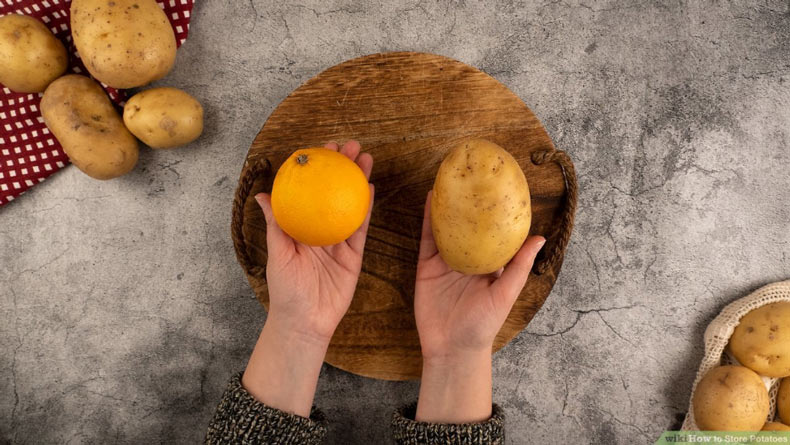
To ensure potatoes last, the longest, buy them when they are fresh and in good condition. When choosing potatoes, consider the following qualities:
Firm to the touch:
Potatoes should be firm, not soft when you purchase them. Look over the potatoes carefully and avoid any wrinkled or green skin. These are signs that they have been exposed to light, which can affect their flavor.
Smooth skin:
The skin should be smooth, clean, and free from blemishes. Any potatoes with many cuts or bruises will likely spoil faster than those in good condition.
No growths:
Look for potatoes free of discoloration, sprouting, or other growths. Potatoes with any of these signs should be avoided as they don't store well and won't last long.
Size:
Select smaller potatoes typically have less starch and fewer eyes than larger varieties. Smaller potatoes also tend to cook faster, so they are a better option for anyone looking to save time in the kitchen.
FAQS
What is the best way to store potatoes at home?
To avoid spoiling, potatoes require proper airflow. The recommended storage approach is to keep them in an open bowl or paper bag where air can circulate freely. Storing them in sealed plastic bags or glass containers with lids that don't allow ventilation is not advisable.
Is it OK to keep potatoes in the fridge?
If you don't have enough pantry space or the environment is too hot or humid, refrigerating your potatoes is an option. However, remember that refrigerated potatoes may turn out sweeter when cooked. They can last for up to 3-4 weeks in the refrigerator.
What's the longest way to store potatoes?
Avoid storing your potatoes in the fridge to keep them fresh for longer. Instead, store them in a cool and dark place with a temperature of around 50°F and 90 to 95 percent humidity. A root cellar that is temperature and humidity-controlled can be a good option for storing them.
Conclusion
In Conclusion, storing potatoes is a simple process requiring certain steps to be taken to keep their freshness and quality for longer periods. After selecting the best potatoes and properly cleaning them, storing them in a cool, dry place away from light and moisture is important.
Keep shallow bowls or bins with air circulation open and uncovered in a cool, dark place to store potatoes. Ensure the potatoes are not overcrowded in the container for optimal freshness. You can take full advantage of potatoes' nutritional benefits by following these simple steps.
